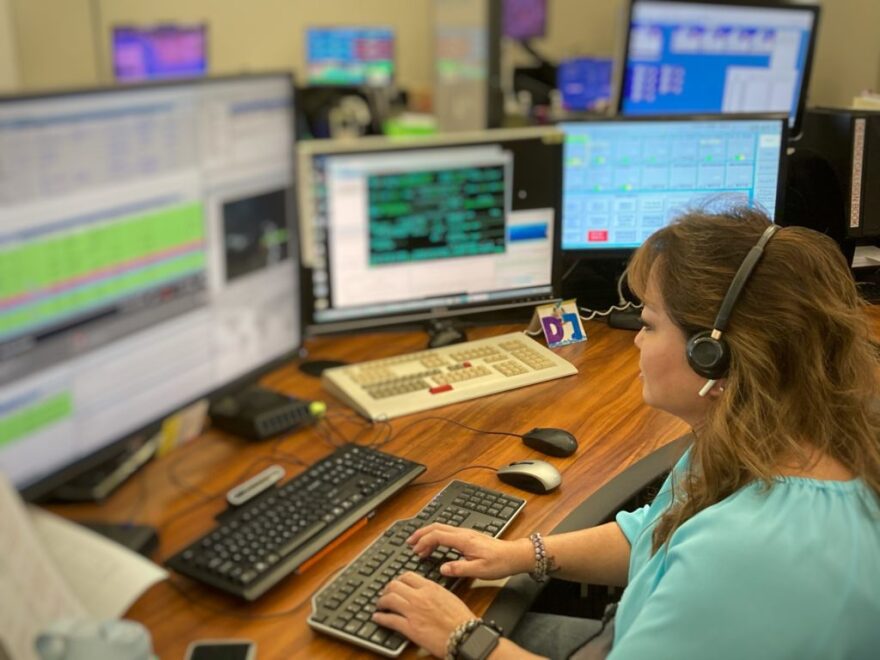The job of being an emergency dispatcher has changed over the years.
"I know when I started, we took under a million calls per year," Lakea Tjomsland, a 20-year employee with the City and County of Honolulu, said earlier this month. "We're at about a million calls in our call center every single year now. It is extremely busy."
Tjomsland said the center will receive around 2,000 calls daily.
"We deal with (everything) from shooting and stabbings to crowing chickens," she said.
During this legislative session, communication dispatchers are advocating for two bills. One, Senate Bill 1059, would add dispatchers to the state's definition of what a first responder is.
A second, House Bill 1398, would allow them to make their own bargaining unit.
Tjomsland said the job is more than just answering calls — it is monitoring where emergency services are, keeping people calm and assessing situations.
"We have a minute to send out this case, a minute makes a difference in anybody who's having an emergency," she said.
To land this type of job, prospects often undergo some of the same background and mental health checks as police officers, but neither the state nor the nation considers actually them first responders.
Additionally, dispatchers in the state are held to mandatory overtime, emergency trainings and they usually become essential workers at times of urgency — like during the pandemic or extreme weather events. Dispatchers in favor of the bill would like to be able to bargain with that in mind, specific to their line of work.
"The federal government doesn't recognize telecommunicators as first responders, but they are addressing that issue right now in Congress," Tjomsland said.
In a way, these two bills, go hand in hand.
"When you do call 911, the first person you speak to is not a police officer. It's not a fireman, it's not a medic. It's a dispatcher," Maui Police Department assistant chief Gregg Okamoto said.
"They often take on the role of the emergency worker, so they are the true first responders."- Gregg Okamoto, Assistant Chief of Maui Police Department
At the MPD, they only have 12 of 39 dispatcher seats filled, Okamoto told the state House Committee on Labor and Government Operations. That means the department is working at a 70% vacancy rate.
"The wages do not adequately compensate our emergency services dispatchers for the work that they do," Okamoto continued. "I think we just need to be competitive and be able to attract the qualified applicants."
This line of work is in collective bargaining unit 3 — which is typically used for clerical and secretarial work.
A 2021 study from Hawaiʻi Occupational Employment and Wages found that on average, a dispatcher makes about $23 an hour, or about $50,000 annually.
However, the state's Office of Collective Bargaining opposes the measure. In written testimony, the department said that separating the titles was not needed and that "the current collective bargaining agreement addresses wages, hours and other conditions of work."
"... Separating telecommunications and emergency dispatchers and employees who perform similar functions employed by the State is not necessary..."- Hawaiʻi Office of Collective Bargaining, HB 1398 written testimony
The City and County of Honolulu's Department of Human Resources also opposes the measure, stating that the bill may complicate employees at the city's Joint Traffic Management Center.
"As presently written, House Bill number 1398 would place all employees who are centrally located at the City's main emergency communication center located at JTMC into the new bargaining unit 16, regardless of their current bargaining unit or union," Director Nola Miyasaki wrote.
But the Honolulu Police Department supports the measure.
"Passage of this bill will help these essential emergency communications personnel negotiate a contract better suited to the specialized needs of their positions, obtain fairer benefits and compensation, and recognize the vital work done by these professionals. This will ideally result in better morale for current employees and a boost in recruitment," HPD Communications Division Capt. Matthew Kurihara said.
As the bill moves forward, there may be a road bump at the state House.
Rep. Scot Matayoshi of Oʻahu, chair of the Committee on Labor and Government Operations, noted there have been at least four proposals to establish new bargaining units this year.
"There are a lot of bargaining unit bills coming through this year, and last year, and I assume in the years to come," Matayoshi said.
Last week, Matayoshi kept the dispatcher's bill moving this session, but he's concerned it may not make it very far.
"We need an objective rule for why one class of workers deserves a separate bargaining unit that applies to all workers, not just their particular class," Matayoshi said. "Until I hear that rule, I am not inclined to make any new bargaining units."
Tjomsland hopes both bills will pass this session.
"Having somebody calm, cool, collected and qualified to address your emergency is priceless, that makes the biggest difference," Tjomsland said.






